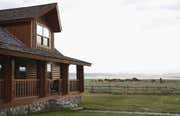Most vacation homes come with all the expenses of a primary residence, including mortgage principal and interest, property taxes, homeowners insurance, utilities, and the cost of maintenance and repairs. Plus association dues, if applicable. In addition, your vacation home may need new appliances and flooring, painting and sealing, furnishings, lighting fixtures, window treatments and supplemental insurance (such as hurricane or flood insurance).
It’s important to consider all these expenses – for both your primary home and vacation property – to determine if a second property is financially feasible. Much of the joy of owning a vacation home is lost if it becomes a financial burden (or a serious money pit).
If it turns out that buying a vacation home is financially manageable, you’ll have to decide how you’re going to pay for it. If you’re buying a primary residence, an FHA-insured loan is ideal because it requires a down payment of just 3.5%. These loans, however, aren’t available for second home purchases, so you’ll have to consider other options.
Cash
If you’re in the financial position to do so, an all-cash purchase is the easiest way to buy a vacation property. Since many vacation home buyers tend to be older and in a more comfortable financial situation, all-cash purchases are fairly common. According to the 2017 National Association of Realtors (NAR) Investment and Vacation Home Buyer’s Survey, 29% of vacation home buyers paid all-cash for their property purchases, as did 36% of investors.
Home-Equity Loan
A home-equity loan allows you to borrow against the equity in your existing home. The loan amount is based on the difference between your home’s current market value and the amount you have left on your mortgage. A home-equity loan may be a good option if you already have substantial equity in your primary residence. In some cases, this can be faster and less expensive than opting for a traditional mortgage. (See also: Home-Equity Loans: What You Need to Know.)
Conventional Loan
Conventional loans typically require sizable down payments. For single-family homes, down payments are generally around 20%, depending on the market and the buyer (remember, you can’t get that 3.5% FHA loan if you’re buying a second home). For condos, the down payment may be closer to 50%, and both the buyer and the condominium association must qualify for the loan. (For related reading, see: Conventional Mortgages and Loans.)
Like buying a primary residence, to qualify for a conventional loan on a vacation property, you’ll need a high credit score, a strong debt-to-income ratio and documentation supporting your income and assets. Not all lenders allow rental income (if the vacation property will be rented out) to be considered for the loan qualification. Lenders that do consider rental income may only allow a percentage to count towards loan qualification, and they may require documentation regarding the property's rental history. (See also: What’s the Difference Between FHA and Conventional Loans?)
Vacation Property Walkthrough: International Vacation Properties
-
 Investing
InvestingVacation Home or Income-Producing Investment?
Rather than let your vacation home sit empty, you can rent it out and make a profit. But you'll need to consider the tax implications. -
 Investing
InvestingRead This Before Buying a Vacation Home with Friends
Going in with friends on a vacation home means savings on the mortgage and expenses, but divergent views and goals could lead to greater costs. Here is how to avoid conflict. -
 IPF - Mortgage
IPF - MortgageMortgages vs. Home Equity Loans: How They Differ
Mortgages and home equity loans both use your home value as collateral, but there are different advantages to each. -
 Investing
InvestingThe Complete Guide to Financing an Investment Property
If you're considering adding an investment property to your portfolio, you need to know what your options are for financing its purchase. -
 Taxes
TaxesTax Breaks for Second-Home Owners
Owning a second home is a great investment for a variety of reasons, but you need to know the tax implications of multi-home ownership.



